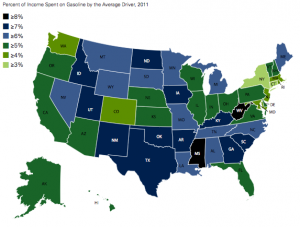 NRDC’s recently released report ranks states in two critical areas related to our nation’s continuing addiction to oil: gas price vulnerability – calculated as the percentage of personal income spent on gasoline by the average driver in each state – and state’s adoptions of solutions to reduce oil dependence.
NRDC’s recently released report ranks states in two critical areas related to our nation’s continuing addiction to oil: gas price vulnerability – calculated as the percentage of personal income spent on gasoline by the average driver in each state – and state’s adoptions of solutions to reduce oil dependence.
The report yields some conclusions:
- All states are impacted by oil dependence, but some states’ drivers are hit harder economically than others.
- The top 6 states most vulnerable to gas prices are Mississippi, West Virginia, South Carolina, Kentucky, Oklahoma and Texas, with the average drivers in these states spending 7.3-9% of their income on gasoline.
- Some states are pursuing solutions to oil dependence, but many states are still taking few, if any, of the steps listed in this report to reduce their oil dependence.
What are the critical state policies to relieve this adverse impact within their borders? Should the federal government incentivize the states to adopt policies that will minimize the oil price impact on its residents? If so, what kinds of incentives?
I agree with the basic finding that families and individuals, particularly low income families and individuals, are hurt as a result of the high cost of gasoline. Inteviews and discussions… Read more »
NRDC’s colorful map looks like a jumble of statistical artifacts. It hardly seems surprising, upon a bit of reflection, that states with a large number of poor people and states… Read more »
The NRDC report suggests reducing vulnerability with clean energy vehicles and advanced fuels. Unfortunately those two measures at this point would also increase costs for lower income families, who are… Read more »